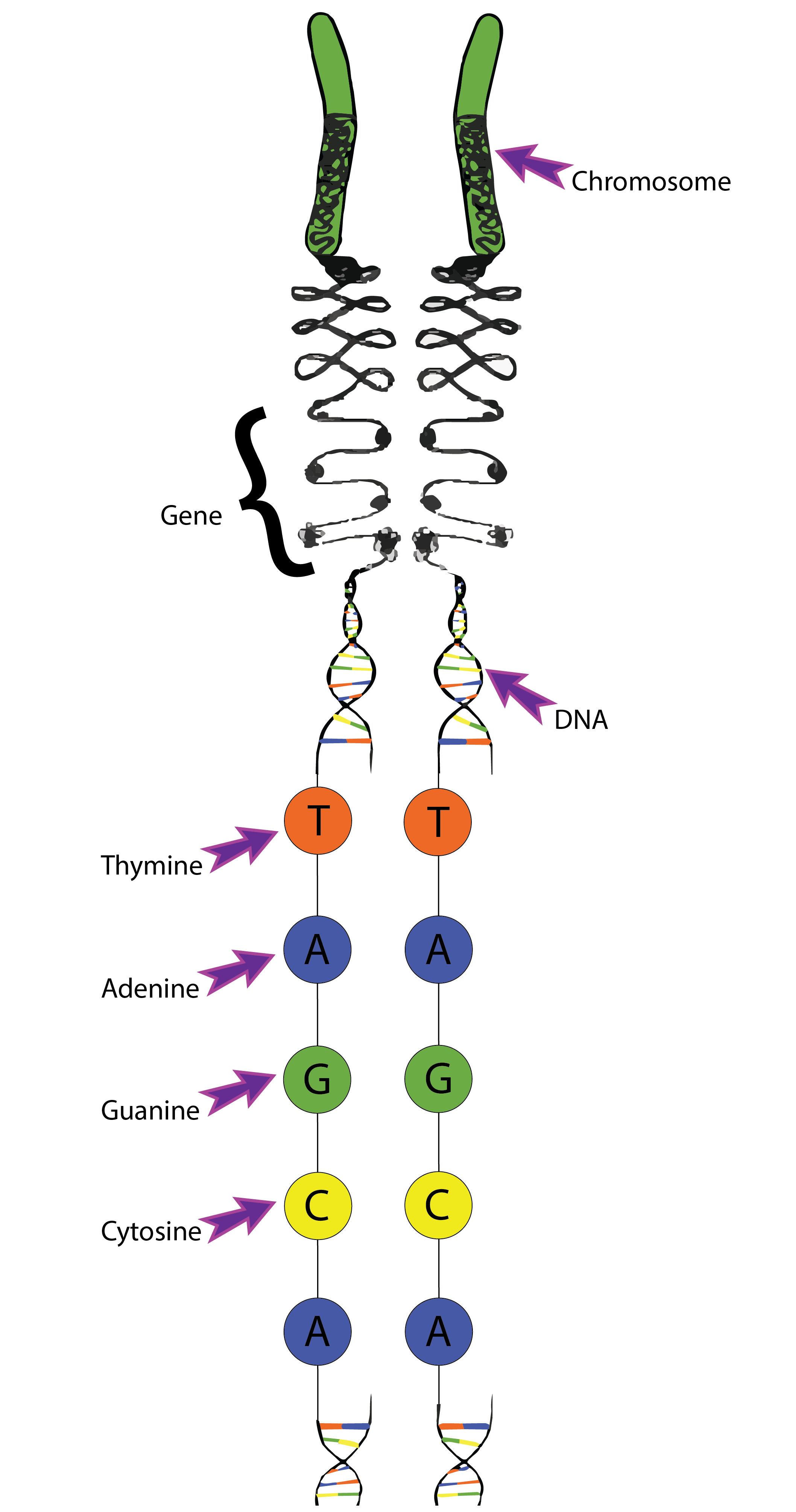Genetics of Stuttering
Genetics is the study of how certain characteristics are passed down - or inherited - from one generation to the next. Genetics has an influence on many characteristics, from the way we look (eg our height and hair colour), to how likely we are to have certain diseases or health conditions.
 In the cells throughout our body, we have a set of genetic instructions. In humans, these instructions are packaged up into 46 chromosomes: we inherit 23 chromosomes from Mum, and 23 from Dad.
In the cells throughout our body, we have a set of genetic instructions. In humans, these instructions are packaged up into 46 chromosomes: we inherit 23 chromosomes from Mum, and 23 from Dad.
Our chromosomes are made of very long molecules called Deoxyribonucleic Acid - better known as DNA - which is in turn made up of four different chemical bases: A (Adenine), C (Cystosine), G (Guanine) and T (Thymine).
Genes are long sections of DNA, which contain specific sequences of bases. The unique sequence of each gene codes for a particular protein. Proteins have many different functions in our bodies, and are essential building blocks for life.
The amount of genetic information in our bodies is vast! Our full genetic code, also known as our genome, is made up of over 3 billion bases, and includes about 20,000 protein-coding genes.
As humans, we are all 99.9% identical in terms of our genetic code. The 99.9% of genetic information that we all share makes us all human - the other 0.1% makes us all unique! There are many ways our genetic code might vary: from just a single base being exchanged for another (eg one person may have a C, where another person may have a T), to long stretches of DNA, up to thousands of bases in length, being copied, removed, or mixed up.
Many of these variations have no influence on our health; however some of these changes, or spelling mistakes in the genetic code, have been found to cause disease, or influence our risk of a certain condition. It is these sorts of genetic changes scientists are most interested in finding and learning more about.
For more information about genetics, click here.
From studies of twins, we have found evidence that stuttering is a heritable trait – this means, that stammering tends to run in families.28-34 These studies have attempted to quantify this, through estimating the heritability of stuttering.
Heritability is a measure of how much of the variability of a trait can be explained by genetics. Heritability estimates for a trait may range from 0 (ie genetics have no influence on the trait) up to 1 (ie the trait is entirely genetic). As an example, height has a heritability of 0.8, which means about 80% of the variability in height within the population is due to genetic factors.
So, what is the heritability of stuttering? We don’t actually have a definitive answer to this. The twin studies gave varying answers to this question, with heritability estimates ranging between 0.42 to 0.85. What all of these studies did agree on however, is that genetics seems to play a significant role in whether or not a person stutters.
For the majority of people, no.
So far, most research into the genetics of stuttering has focussed on examining families with several members who stutter. These studies used techniques such as linkage and targeted sequencing to find genetic variants that were shared among the people in these families who stuttered. Through these studies, genetic variants in four genes have been found: GNPTAB; GNPTG; NAGPA35, 36; AP4E1.37
For most people though, we don’t expect a single gene to be responsible for their stutter. Current evidence suggests that generally, across the population, stuttering is a complex trait - that means their stutter is due to a combination of several genetic, and other, non-genetic factors. Stuttering is not unique in this - many diseases, including diabetes, depression, and asthma, and traits such as height and even a person’s smoking habits are also considered to be complex genetic traits.
A genome-wide association study, is an approach that has been used by scientists to successfully pinpoint genetic variants that are associated with a range of complex genetic traits. These genome-wide association studies (or GWAS for short) examine millions of genetic variants, from across the genome, in thousands of often unrelated individuals.
We think that a GWAS of stuttering in a very large number of individuals, has the potential to discover genetic variants that are associated with stuttering. Finding these genetic variants, could help us to understand more about the biology behind stuttering. This knowledge could help us to identify who might be likely to have a stutter, or even lead to new treatments. This is what we have set out to do in the Genetics of Stuttering Study.
Click here to find out how we are hoping to explore the genetics of stuttering in our study!


